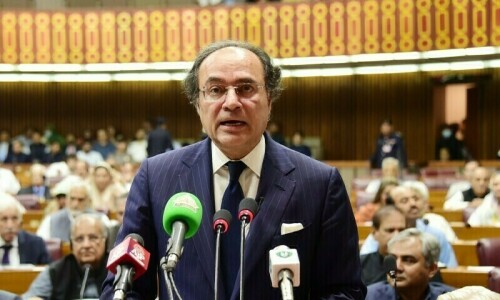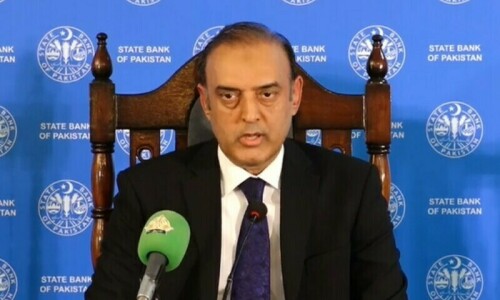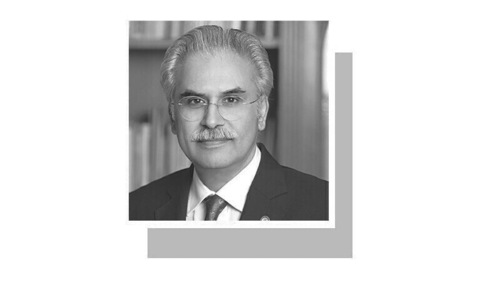ISLAMABAD: The Supreme Court on Friday revoked lifetime disqualification of estranged PTI leader Faisal Vawda under Article 62(1)(f) of the Constitution though he will remain ineligible to enter electoral arena until the present term of the National Assembly ends in August 2023.
Mr Vawda will have to resign as senator by tendering his resignation before the Senate chairman forthwith.
“We don’t want to embarrass the parliamentarians,” Chief Justice of Pakistan (CJP) Umar Ata Bandial observed, adding that it was not the court’s intention to dislodge them but the politicians should also show seriousness while making declaration about themselves in the nomination papers instead of purging them.
The CJP was heading a three-judge SC bench, also comprising Justice Syed Mansoor Ali Shah and Justice Ayesha A. Malik, that had taken up Mr Vawda’s appeal against his disqualification for life by the Election Commission of Pakistan (ECP).
Lifetime disqualification revoked after estranged PTI leader regrets ‘erroneous’ statement before Supreme Court
The Supreme Court set aside the ECP’s decision of his ineligibility and the Islamabad High Court’s rejection of his earlier challenge to ECP decision in which the high court had held that the ECP was bound to give effect to earlier apex court’s declarations.
Mr Vawda was required to appear before the SC bench on Friday either to express his regrets for misstating about his dual nationality or face disqualification for life. He was also required to furnish before the court on Friday the certificate of loss of nationality in the US commonly known as renunciation certificate.
He was facing the charges of presenting an expired passport before the returning officer at the time of filing his nomination papers for the 2018 general elections from National Assembly constituency (NA-[249) on June 7, 2018 claiming he had renounced his US citizenship.
Clad in a light brown suit at the rostrum of the courtroom, Vawda tendered unconditional apology and said the misstatement about his dual nationality was legally incorrect but unintentional since he contested the 2018 general elections for the first time and this was entirely on the court to determine about his fate.
At this, CJP asked Vawda if he did not give a clear statement, then the court would continue with hearing in terms of Article 62(1)(f) otherwise he would be disqualified under Article 63(1)(c) which determines disqualification of a member if he ceases to be a citizen of Pakistan or acquires the citizenship of a foreign state for one term of the house.
When the estranged PTI leader agreed to opt for the option by giving a signed statement, the CJP observed that Vawda had shown character and that the lawmaker upheld the high standard, expected of the parliamentarians, which was confidence inspiring.
The court, however, stated nothing as to what would become of Nisar Ahmed Khuhro who bagged the seat after it got vacated following the ECP disqualification as he won as PPPP senator against the general seat from Sindh until March 2027 when the term will expire.
When contacted, senior lawyers Farooq H. Naek who represented Mr Khuhro and Sajeel Shaharyar Swati who represented ECP were in agreement that fresh elections may be held on the seat.
When during the hearing, Mr Naek tried to intervene as the court disqualified Mr Vawda under Article 63(1)(c), the CJP observed that Mr Naek and Waseem Sajjad (counsel for Mr Vawda) were the ‘father of the parliamentarians’, being former chairmen of the Senate.
In its order, the SC observed that petitioner Vawda had stated before the bench he regretted the claim of renunciation of US nationality in his nomination papers by explaining that he had already applied for such renunciation before filing the nomination papers. He explained that his certificate of loss of US nationality was issued to him on June 25, 2018. As a result of the difference of dates, he was actually disqualified to contest the general elections under Article 63(1)(c) on the date he filed the nomination papers, the order said, adding consequently the affidavit of Vawda made an erroneous statement.
He, however, regretted the same and accepted that he stand disqualified for the term of the National Assembly until the year 2023 and though he was elected senator, in order to demonstrate good faith he would resign as senator until the period of his disqualification expires.
Mr Vawda also presented his signed regrets before the court as a result of which the court set aside the IHC and ECP decisions, with a direction to Vawda to send his resignation to Senate chairman.
“I think Allah Almighty is kind to me since the Supreme Court stated that he showed character and grace,” said Mr Vawda while talking to Dawn after proceedings.
“It is most satisfying for me since these appreciation has come from three top judges of the highest court,” he said, adding that he had been given chance to resign as senator.
Published in Dawn, November 26th, 2022












































